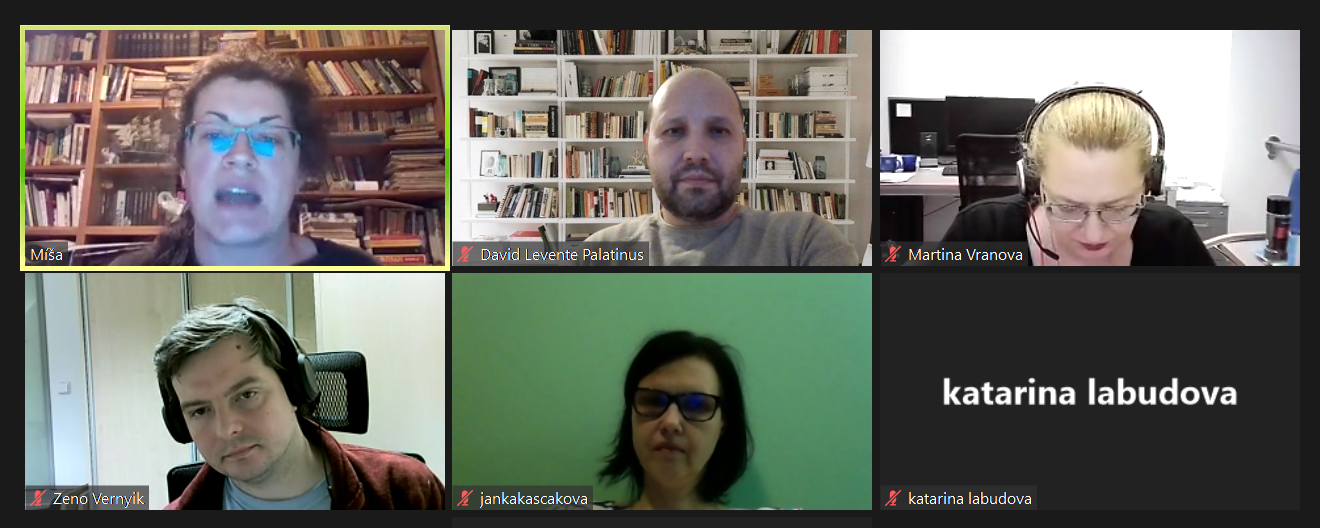Report on the “On and Beyond J. R. R. Tolkien and the Fantasy Genre in Post-Socialist Central Europe” workshop

This workshop (convened and chaired by David Palatinus, and realized within the VEGA project) brought together a team of Czech and Slovak scholars to look current trends in Central European fantasy writing and fantasy studies. The premise of the workshop was that due in part to the success of the film adaptations, Tolkien, and by extension, fantasy has recently been rediscovered as a trending genre paradigm in Western literary and media scholarship. It is perceived as a conduit for underlying cultural ideas about world-building and historical nostalgia, transmediality, fandom and participatory culture as well as media convergence. The fantasy genre has always had a strong tradition in Central Europe as well. Yet, while the fandom is increasing, the scholarly study of Central European fantasy (and Tolkien’s legacy therein) has lagged behind. The workshop aimed to ask questions about what the shifting focus of literary scholarship towards popular genres reveals about forms of cultural import from Anglophone contexts between and across literary fiction and screen media in Czech and Slovak contexts, and offered methodological reflections on the metamorphoses of fantasy across gernes and media that ensure the survival of this peculiar genre and mode.
Given the peculiar circumstances due to the pandemic, the workshop took place ONLINE, via Zoom.
The discussion was opened by Michaela Markova (Technical University of Liberec), whose contribution documented the tendencies within the field of Czech fantasy writing in the post-1989 era. Dr. Markova asked whether such tendencies mirrored the development and changes within the field as such (with regards to Tolkien's legacy), or whether there were some which reflect specificities of the Czech context, and if the two need to be considered as mutually exclusive. She then proceeded to introduce the collaborative anthology Tajná kniha Šerosvitu (Albatros 2011), and tried to place it within the contemporary Czech fantasy scene, and emphasized the benefits of fantasy writing for the young adult age group.
Martina Vranova’s (Brno University of Technology) talk approached young-adult fantasy through Erik Erikson’s ideas that took a psychosocial twist on psychoanalysis and claimed that each stage of life was characterized by a crisis which was to be resolved so that a human being could develop healthily. The process of identity formation is indeed social as one cannot identify oneself without identifying with a group of people. She then offered a brief examination of iconic fantasy characters (from Bilbo Baggins to Paul Atreides to Arabella Ashby to Marvel’s Loki) as examples of practice. Dr. Vranova concluded by suggesting that through immersion in alternative possible worlds (created by fiction), adolescents may be given a chance to resolve an identity crisis which is not possible to be resolved in their real lives. To adolescents, fictional worlds of whatever kind provide a safe space where they can experiment, be bold, and fail without actual consequences.
Janka Kascakova (Catholic University of Ruzomberok) returned the discussion to Tolkien’s legacy and pointed out the strong political ties that fantasy has always had to the lived experiences of audiences and their historical circumstances in socialist Central Europe. Her presentation focused on both the reception and publication histories of Tolkien’s The Lord of the Rings in the former Czechoslovakia. She pointed out the correlation between censorship, allegorical readings, and the strong responses on the part of niche audiences in specific historical contexts.
Zeno Vernyik (Technical University of Liberec) offered a close-reading of Martina Vranova’s fantasy/sci-fi novel Psohlavec(2018, eKnihy jedou), and emphasized the underlying hybridity of fantasy as a mode, with reverberations of elements of science-fiction, immersion and political satire in Vranova’s world building. Dr. Vernyik’s presentation concluded with a miscellanea of further intertextual refences to the name ‘Psohlavec’, cutting across multiple fictional and non-fictional genres in the 19th and 20thcenturies, and a brief discussion of the ways naming mobilizes modes of political and historical allegorization in the world-building of Central_European fantasy.
Last but not least David L. Palatinus (Catholic University in Ruzomberok) discussed the centrality of screen media (film, television and video games) in the gradual move of fantasy from a niche genre to a more mainstream mode. He discussed the technological shifts in filmmaking (filming, editing, the proliferation of digital technology) that facilitated the adaptation of specific narratives to the big screen, and how those adaptations played a crucial role in bringing fantasy into the center of (critical) attention. Dr. Palatinus discussed the special impact HBO’s Game of Thrones had on the ways theories of adaptation, transmediality, convergence and participatory agency have been repositioned. He concluded by emphasizing the correlation between the proliferation of streaming platforms (Netflix, Amazon Prime, Disney+) in Central Europe and at the growing number of serial renditions of fantasy, and proposed we saw streaming as particularly conducive to the increasing popularity and visibility of the fantasy mode.
Recordings of the talks and discussion session of the workshop will be made available soon.

